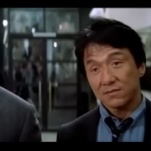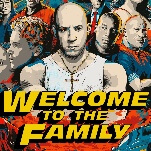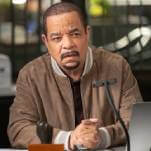“Unidentified Black Males” (season 5, episode 9; originally aired 5/2/2004)
In which Tony tries to stay neutral
The most common argument against season five of The Sopranos is that it’s just a time-marking season. And in some ways, I can understand that argument. If you’re looking for an exciting plot, then this season just remixes a bunch of stuff the show’s already done. Adriana’s story is a rerun of the Pussy informant storyline. The Tony B. stuff has lots and lots of comparison points over the years; even if the “he’s just out of jail and trying to go straight” layer makes it seem different, that’s just a character level. On the plot level, it’s not functionally all that different from, say, Richie or Ralphie. Tony and Carmela have always had marital struggles. And we’ve always had intimations of war with New York, so the civil war within that organization isn’t all that different from the hints we’ve gotten before. So, yes, if you were watching the show and waiting for the dominos to start falling, for Tony to start getting backed into a corner and fighting his way out, then I can see season five seeming like a huge disappointment. I’d argue The Sopranos was never that show, but I’ve never cared as much about plot as most.
No, season five of The Sopranos is ultimately about one, very important question, perhaps the most important question in the history of the show’s run: Can Tony Soprano be saved? And the answer is somewhat surprising: Maybe. But you’ll need a time machine.
It will be difficult to suggest this without spoiling the end of the season, but I’ll do my best. The whole season, as I’ve argued before, is a Shakespearean construction, where we see Tony’s tragic flaw—his inability to be honest with himself about the way that his job has destroyed his soul. (You could alternate that with the fact that the way he was raised left him a gaping wound that longed for affection but, instead, turned into scar tissue.) At several points throughout this season—and we’ve seen some and will see more coming up—Tony is presented with fairly clear moral choices, moral choices that will lead, alternately, to him being able to find redemption or him needing to be destroyed for the universe to be “right.” And so far, he’s made all of the wrong choices. And so have the people around him.
“Well, so what?” you might say. “How is that any different from any other season of the show?” Ah, but you see, this is the season when Tony finally starts to edge right up to being genuinely honest with himself and with someone else. His sessions with Dr. Melfi finally dig deeply enough to get to some of the core things that make Tony Soprano who he is. In some cases, he shies away from those things. Look at how “In Camelot” forced Tony to look directly at the ways that his father contributed to the misery that Livia Soprano felt, the misery that she dragged her children into. And yet by the end of the episode, he was looking away as much as he could, rather than really facing down what that meant for his life. He’s a man who’s grown comfortable thinking of the world in certain ways, and changing the way he thinks about his life is the hardest thing he could ever do.
But in this episode, Melfi actually gets him to push past one of the bullshit stories he’s been telling himself all these years. Tony falls back on the idea of “Unidentified Black Males” who fell upon him when he was supposed to meet Tony B. all those years ago for that truck hijacking. Melfi doesn’t even try to push him on that idea; indeed, she questions it as little as Meadow questions that Jackie Jr. was killed by those same unidentified black males or as little as anyone questions the idea that Joey Peeps was killed by the same. Melfi, of course, has no reason to doubt what Tony tells her, while characters with connections to the mob world recognize the idea of these non-specified African-Americans as being a handy way of saying, “someone in the mob did it, but we don’t know who and aren’t particularly curious in finding out.” One look at Meadow’s face at the end of season three is all you need to know that she really knows what happened, deep down. But the lie is good enough to work for the wider world, and that means it’s good enough to work on Melfi.
No, the person who pushes to reveal what really happened—that Tony had a panic attack after an altercation with his mother and cut his head open on the car door he’d just opened—is Tony himself. It comes in a moment where he really seems ready to push past the bullshit he regularly feeds Melfi about his life and line of work. (Note that earlier he had talked about the crime Tony B. was involved in more openly than he’s discussed these crimes with Melfi before this point.) He starts to have a panic attack in the office—almost as if he’s living an echo of the panic attack from all those years before—and talking about what really happened is a way of getting the toxins out. Not for nothing does he say that going to Melfi’s office is sometimes like “taking a shit.”
These “Unidentified Black Males” pop up throughout this episode, and they’re always used as a bandage over something that is painful to remember or over something that would need explaining to the police. They’re a quick fix that works, but they’re also a way to avoid responsibility and being honest with yourself. Four different people mention these false perpetrators in this episode: Tony, when making an excuse for why he wasn’t with Tony B.; Tony B., when explaining why he’s walking with a limp; Meadow, when talking about who killed Jackie Jr. to Finn, who’s afraid to go to the work site; and Eugene Pontecorvo, after he beats up Little Paulie. We see opportunism in the lattermost case. We see an attempt to hide from the truth and an attempt to keep a boyfriend close with Meadow. We see a decision to distance oneself as far as possible, a simple self-preservation method, with Tony B. And, finally, we see a way to avoid guilt with Tony S., who has obviously been eaten away by the events of all those years ago, even if he’d never admit it. (Look at the alibi he makes up for Tony B.: The two Tonys were out looking for Tony B.’s long-missing daughter, Kelli, just another thing Tony B. lost because of his cousin.)
But the denial doesn’t just happen to the men of the mob. As we can see from how Meadow tries to assure Finn that Vito’s menacing behavior—after Finn catches Vito giving a blow job to a security guard at the job site early one morning—is not what he thinks it is (to the degree that she calls into question what he saw completely), there’s a strong element of this in anyone even the slightest bit connected to this. Meadow, who was once telling her little brother to open his eyes as to where their father’s money really came from, continues to make excuses, continues to take part in the cover-up. And that’s coming after she was obviously pretty sure what had really happened to Jackie Jr., too. At some point, living in this world and living this life becomes a constant struggle to not fall deeper into the pit, and the show is suggesting that Meadow—who was once seen as Tony’s potential hope—is just too far gone. Now, the struggle is for Finn’s soul, and when he and Meadow get into their fight (a fight that lasts seemingly all night), he finally figures out a way out of it by just asking her to marry him. He’s seen just what these guys are capable of when Eugene beats up Little Paulie. He’s been both bribed and threatened (and maybe propositioned?) by Vito. He’s been treated sycophantically by Paulie and the other guys on the job site. And now he’s got the perfect opportunity to escape, after Meadow throws a tantrum about how he wants to be away from her, rather than face up to his very real issues. And instead, he gets in even deeper, perhaps because he loves Meadow, perhaps because it’s the only way he’s sure he’ll be safe, perhaps because he just wants the fight over. More likely than not, it’s all three.
There’s a lot of that in this episode: Somebody does something, and it sets off a pinball machine of unintended consequences. Tony B. kills Joey Peeps, and that leads to Tony’s suspicions (which Tony B. refuses to confirm, for obvious reasons), but it also leads to Johnny Sack sharing his own suspicions, ones that cause Tony to dig himself in even deeper in protection of his cousin. For someone who’s often all about self-preservation, he’s putting a lot on the line here for someone he hasn’t really seen for over a decade. (I think it’s remarkable how much Tony describes his cousin in terms of wasted potential in this episode, in terms of missing daughters and long-gone wives and 158 IQs.) But the decision to bump Tony B. up also leads to Christopher complaining to Adriana, who places a call to the FBI, who just might be able to start to put things together about Joey Peeps being killed by a man with a limp…
Of course, we don’t know how much information the FBI has. And we don’t know how much Johnny Sack knows. And we don’t know how well Tony’s alibi will hold up. “Unidentified Black Males,” in addition to everything else it’s doing, manages to pull off the feat of showing just how quickly any one action Tony takes could spiral utterly out of control for him. He makes lots of risky moves here, risky moves he’s not entirely certain of as he makes them. If any one of these loose ends is tugged at too hard, the whole thing will fall apart. But that’s just the way life is when you’re Tony Soprano: Any one thing you do could be the thing that brings it all down around your head. Better to not live with that thought constantly in mind. Better to keep blaming things on phantoms who don’t exist than really facing up to your problems.
As I mentioned up above, the pivotal question of The Sopranos season five is whether or not Tony Soprano can be saved. Yes, it’s a theme that’s been present since the series’ beginning, but this season zeroes in on it in a way that previous seasons did not. In the past, the question was often, “What will Tony Soprano do next?” But the show has given us a fairly good base of knowledge to draw from when we contemplate how he might deal with what Finn saw Vito doing if that knowledge ever got out or how he might deal with Tony B. if Johnny Sack found out the true nature of his involvement in Joey Peeps’ death. We have a pretty good answer in both cases. But now we’re moving into the end game. We’re moving into more basic questions about this man, about his everlasting soul, if you will. We know he’s not a good man. And we know he probably won’t ever be a good man. What season five wants us to contemplate is if there was ever a point where he could have been good, where he could have been someone other than what he became.
And the answer is discomfiting. Because if he’d told his mother the truth about where his father was the night of her miscarriage or if he’d been there to help Tony B. with the hijacking, those events wouldn’t have somehow made him “better” or pointed him on the right path. The question of how one gets sucked down into the pit is a question of small steps and measures undertaken as brief compromises that become more and more complicated. Tony Soprano never started out like Finn—an over-privileged California kid with everything coming to him on a silver platter. But like Finn, there were times when he could have gotten out and, instead, he chose to keep getting in deeper. It’s not a moment. It’s not something that happens. It’s a long slide, and by the time you look up, it’s impossible to climb out.
Stray observations:
- We also see this reflected in Carmela, all season long. She’s trying to make her climb out of the life she found herself sliding into, but she’s simply unable. In this episode, Tony has all but made it impossible for her to find a good divorce attorney (and once she does, he messes that up too), and after the two have sex, he doesn’t bother calling or seeing her. She sees him floating around in the backyard pool as Meadow tells her the news of her engagement, and a million thoughts flash across her eyes. Is she stuck? Does she remember a time when she felt that excited about Tony? Is this it? (Really, “Is this it?” might be the best way to sum this show up in a nutshell.)
- Joseph R. Gannascoli, the actor who plays Vito, was the inspiration for the idea that the character should be gay. He apparently read a magazine article about a gay mobster who was allowed to live because he was a good earner. Thanks, Wikipedia!
- This, for me, is one of my favorite performances by Lorraine Bracco in the whole series. She has so little to do, but she does it so well, and she’s so… strong in that scene where Tony has the attack, as she realizes that the two of them are really and truly moving toward something. The Sopranos is often described as a show about a mobster, but it’s also a show about a guy working his way through a very difficult therapy process, and this is one of the key episodes in that regard.
- Agent Sanseverino has a bratty little kid, looks like. That, or her kid is perfectly all right, and she treats her like a brat. I suspect the latter.
- Vito is right about the Padres: Finn probably should have stuck with the Angels, who were about to go on a tear that would usually leave them at or near the top of the AL West. That said, they never again got close to the World Series, so it’s not like Finn lost anything with his Padre pride.
- I like the way this season slowly points out just how beholden Tony feels toward Tony B. After all, he smuggled the guy’s sperm out of prison!
- We briefly see Little Carmine, and he and Johnny Sack continue to refuse to make the peace. If you’re wondering what the hell is up with the New York stuff, all you need to know is that it’s pretty much the same as it was last week.
- “Plus, it’s bat night” Vito’s so excited about this!
- “Sometimes, what happens in here is like taking a shit.”
Speaking With The Fishes (spoilers):
- Vito’s blow job, of course, will spiral out into a plot that dominates the latter half of season 6A, even though it takes up very little screentime compared to other stuff. However, the episode where Vito escapes to New Hampshire proved very divisive for fans, so it’s become a stand-in for the problems many fans had with season 6A. We’ll get there. (It’s not as bad as you remember it being.)
- I think from here on out, Carmela and Tony are working toward reconciliation. Am I wrong on that?
- I’ve also always read this phone call from Adriana as being one piece of the puzzle that leads to Johnny Sack being put away at the end of the season—she couldn’t touch Tony, but she could bring other houses down—but I’m probably wrong about that.
Next week: Tony and Melfi continue delving into the “Soprano temper” in “Cold Cuts.”









































